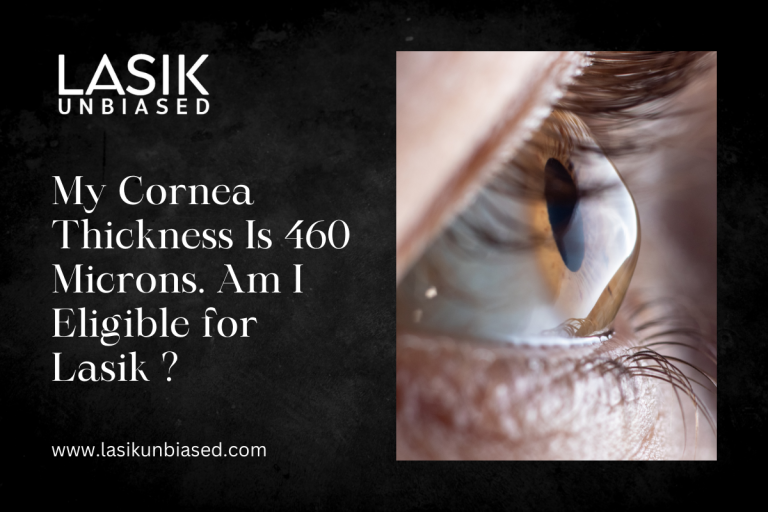LASIK surgery is a popular and effective option for correcting refractive vision problems, such as nearsightedness, farsightedness, and astigmatism. Corneal thickness is one of the most critical factors determining your eligibility for the procedure. If your cornea is too thin, you may not be a good candidate for LASIK. If your cornea thickness is 460 microns, you might wonder if you are eligible for LASIK surgery. This article will explore the relationship between corneal thickness and LASIK, what your 460-micron thickness means, and other factors that affect LASIK eligibility.
What is LASIK Surgery?
LASIK (Laser-Assisted in Situ Keratomileusis) is a widely performed eye surgery that uses a laser to reshape the cornea and improve the focus of light onto the retina. This results in clearer vision without needing corrective lenses like glasses or contact lenses. LASIK surgery is safe, effective, and highly successful, with millions of people worldwide having undergone the procedure.
The Role of the Cornea in LASIK
The cornea is responsible for focusing light entering your eye and plays a significant role in your vision. In LASIK surgery, a thin flap of corneal tissue is created, and the underlying tissue is reshaped using an excimer laser. This reshaping alters how light is bent, improving the refractive error and providing more precise vision.
Why Is Corneal Thickness Important for LASIK?
Corneal thickness is crucial for LASIK surgery because it affects how much tissue can be safely removed without compromising the structural integrity of the eye. If the cornea is too thin, removing tissue may weaken the cornea and increase the risk of complications like corneal ectasia, a condition where the cornea becomes unstable and bulges outward.
A minimum corneal thickness of 500 microns is recommended for LASIK surgery. However, the minimum requirement may vary depending on factors such as the type of refractive error, the laser system used, and the surgeon’s experience.
Is 460 Microns Sufficient for LASIK?
If your cornea thickness is 460 microns, you may wonder if you are still eligible for LASIK. Generally, 460 microns is considered thinner than the standard 500-micron threshold. However, that does not necessarily mean you are automatically disqualified from LASIK surgery. Other factors may play a role in determining your eligibility for the procedure.
Alternatives to LASIK for Thin Corneas
If your corneal thickness is not ideal for LASIK, there are alternative treatments you can consider. Some of these options may allow you to achieve clear vision without needing glasses or contact lenses. These alternatives include:
1. PRK (Photorefractive Keratectomy)
PRK is another laser eye surgery similar to LASIK, but the main difference is that no corneal flap is created. In PRK, the outer layer of the cornea (the epithelium) is removed, and the underlying tissue is reshaped with a laser. This procedure can be a good option for individuals with thinner corneas because it does not require the creation of a flap.
2. SMILE (Small Incision Lenticule Extraction)
SMILE is a minimally invasive, newer laser procedure that can be an alternative to LASIK. In this procedure, a small incision is made in the cornea, and a small piece of tissue is removed to reshape the cornea. Since SMILE requires a smaller incision than LASIK, it may be a viable option for those with thinner corneas.
3. ICL (Implantable Collamer Lens)
For individuals who are not candidates for LASIK or PRK, ICL is another option. This procedure involves implanting a lens inside the eye to correct refractive errors. It is reversible and may be suitable for those with thin corneas or high prescriptions.
4. Corneal Cross-Linking
Corneal cross-linking is a procedure that strengthens the cornea and may help prevent further thinning. This treatment is typically used for individuals with keratoconus or those whose corneas are too thin for LASIK. It can improve corneal stability and may make LASIK or other procedures possible in the future.
What Are the Factors That Influence LASIK Eligibility?
Corneal thickness is just one factor determining whether you are a good candidate for LASIK. Other key factors include:
1. Age and Overall Health
LASIK candidates should be at least 18, as the eyes may still change in younger individuals. Additionally, the person’s overall health should be good, with no severe eye conditions, autoimmune diseases, or uncontrolled health issues that could affect the healing process after surgery.
2. Stability of Vision
For LASIK to be effective, your prescription should have been stable for at least one year before the procedure. Rapid changes in your vision indicate that your eyes may still be undergoing changes, which could lead to less predictable results from the surgery.
3. Refractive Error
The severity of your refractive error (nearsightedness, farsightedness, or astigmatism) will influence your LASIK eligibility. While LASIK can treat most common refractive errors, individuals with extremely high prescriptions may not be suitable candidates.
4. Healthy Eyes
You must have healthy eyes with no signs of eye diseases like glaucoma, cataracts, or severe dry eye. If you have any of these conditions, LASIK may not be a safe option, and other treatments may need to be considered.
5. Corneal Shape and Quality
In addition to thickness, the shape and quality of the cornea are essential considerations. An irregular cornea or one with other issues, such as scarring or thin spots, may prevent a safe and effective LASIK procedure.
You should schedule a comprehensive eye exam with an experienced LASIK surgeon to determine if LASIK is right for you. During the exam, the surgeon will evaluate your corneal thickness, overall eye health, refractive error, and other factors to help determine if LASIK or an alternative treatment is best for you. Your surgeon will also discuss your goals and expectations for the procedure and any potential risks or limitations.


